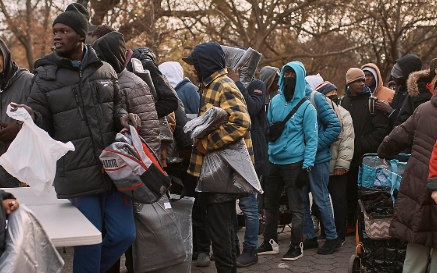The Impact of U.S. Deportation Policies on African Migrants


The U.S. Immigration and Customs Enforcement (ICE) has launched a significant deportation campaign targeting undocumented immigrants, with a notable focus on African nationals. Somalia leads the list of affected African countries, with 4,090 Somali citizens marked for deportation, followed by Nigeria (3,690) and Ghana (3,228). This initiative aligns with the Trump administration’s intensified immigration policies aimed at curbing illegal immigration.
The deportation policies of the United States have profound implications for African migrants, particularly in light of recent political shifts and enforcement strategies. The evolving landscape of immigration policy under the Trump administration introduced a series of measures that disproportionately affected African nationals, exacerbating existing challenges faced by these communities.
Current Trends in Deportation Policies
One of the most significant aspects of recent U.S. immigration policies is the increase in deportations. The Trump administration implemented aggressive deportation strategies, including the use of expedited removal processes that allow for the swift deportation of undocumented immigrants without a hearing before an immigration judge. This policy change is particularly concerning for African migrants, many of whom may not have had the opportunity to establish long-term residency in the U.S. and thus face immediate removal upon apprehension.

Additionally, the broader scope of immigration enforcement has led to intensified crackdowns in major U.S. cities. Reports indicate that thousands of African nationals, including those from Nigeria and Somalia, have been issued deportation orders as part of a larger initiative targeting undocumented immigrants. This includes individuals who entered the U.S. through irregular channels, such as those who arrived via Central American routes like Nicaragua.
Also Read: 15 Year Old Ethiopian Immigrant Is TIME 2024 Kid of the Year
Another critical issue affecting African migrants is the potential rescission of Temporary Protected Status (TPS) for certain African nations. Countries such as Cameroon, Ethiopia, Somalia, South Sudan, and Sudan have benefited from TPS, which provides temporary protection from deportation and work authorization. However, the revocation of this status would leave many African migrants vulnerable to removal, stripping them of their legal rights to reside and work in the U.S.

Socioeconomic Consequences
The impact of U.S. deportation policies extends beyond the immediate effect of removal; they have deep and lasting socioeconomic consequences for both deportees and their home countries. Many deportees return to their countries with significant financial burdens, including debts incurred during their migration journey. This complicates their reintegration into local economies that are often already struggling due to poverty and instability.
Furthermore, deportation can increase the vulnerability of individuals who fled their home countries due to violence, political instability, or economic hardship. Many African migrants sought refuge in the U.S. to escape dire conditions, only to be forcibly returned to environments that remain unsafe. These challenges are further compounded by U.S. foreign policies that have contributed to instability in various African regions. Military interventions, economic exploitation, and political interference by U.S. entities have played a role in exacerbating the conditions that force individuals to migrate in the first place.
Another major concern is the racial disparities in immigration enforcement. Studies indicate that Black migrants, including Africans, are disproportionately affected by deportation policies. Data shows that Black immigrants are nearly three times more likely to be detained and face deportation compared to other migrant groups. This disparity highlights systemic biases within immigration enforcement and raises concerns about racial discrimination in U.S. immigration policies.

Political Implications
The U.S. deportation policies have broader political implications, particularly in relation to diplomatic relations with African nations. As the U.S. government seeks to negotiate trade agreements and other cooperative initiatives with African countries, the willingness of these governments to accept deportees may influence diplomatic engagements. Countries that resist accepting deported nationals may face economic or political consequences from the U.S. government.
Looking ahead, the future of deportation policies remains uncertain as discussions about immigration reform continue. Changes in leadership and policy direction could either tighten or loosen enforcement measures, with direct consequences for African migrants. However, current trends suggest a continued emphasis on strict enforcement, which could further marginalize African communities within the U.S.
Also Read: Year Of Return: Ghana And Jamaica Waive Entry Visa Requirements
Conclusion
In conclusion, U.S. deportation policies have significant and far-reaching consequences for African migrants. Increased enforcement actions, socioeconomic hardships upon return, and complex diplomatic negotiations all contribute to the broader impact of these policies. As immigration policies continue to evolve, it is crucial to scrutinize their implications for human rights and international relations, ensuring that affected communities receive fair and just treatment.







Responses